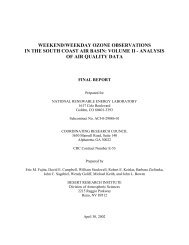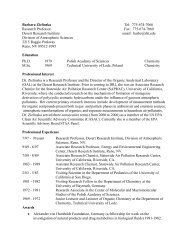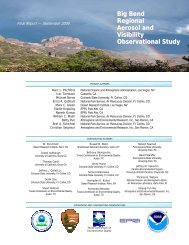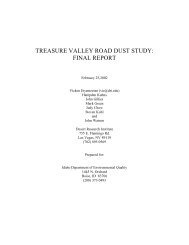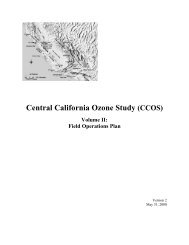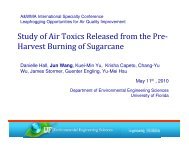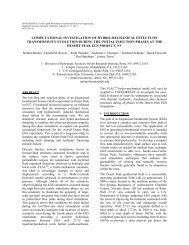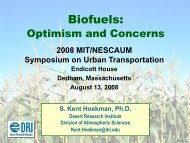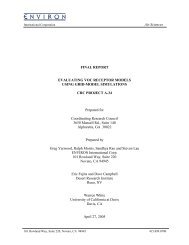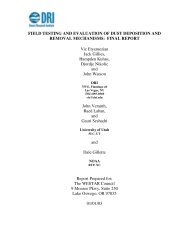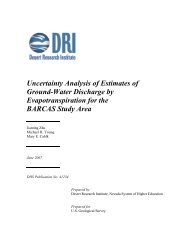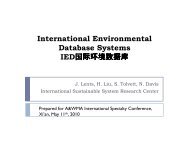Assessment of Conversion Technologies for Bioalcohol Fuel ...
Assessment of Conversion Technologies for Bioalcohol Fuel ...
Assessment of Conversion Technologies for Bioalcohol Fuel ...
Create successful ePaper yourself
Turn your PDF publications into a flip-book with our unique Google optimized e-Paper software.
Future Plans–The company has licensed its technology to Marubeni Corporation to<br />
operate a 323,424 gallon per year plant in Osaka, Japan, expected to be operational<br />
in 2007 and expanded to a capacity <strong>of</strong> 1.057 million gallons in 2008. With completion<br />
<strong>of</strong> Celunol’s merger with Diversa, the combined companies intend to accelerate the<br />
commercialization <strong>of</strong> their cellulosic ethanol production technology. A commercialscale<br />
facility at the Jennings, LA site is among the future projects under consideration.<br />
Dedini Industrias de Base, Piracicaiba, SP, Brazil<br />
Organizational Background–The Brazilian company Dedini, <strong>for</strong>med in 1920, is one<br />
<strong>of</strong> Brazil’s largest and most diverse industrial corporations,with areas <strong>of</strong> business<br />
ranging from chemicals, to food and beverages, to mining and cement, and including a<br />
number <strong>of</strong> energy-related business areas. One <strong>of</strong> Dedini’s primary areas <strong>of</strong><br />
specialization is equipment <strong>for</strong> sugar and ethanol production plants as well as<br />
complete turn-key plants. Over 80% <strong>of</strong> the ethanol produced in Brazil reportedly<br />
employs Dedini equipment. In 1987, Dedini began development <strong>of</strong> biomass-to-ethanol<br />
production technology, in partnership with the Brazilian sugar and ethanol producer<br />
Copersucar and the State <strong>of</strong> Sao Paulo Research Supporting Foundation (FAPESP),<br />
with funding support from the World Bank.<br />
Technology Characteristics–Dedini’s technology, shown in Figure A10, is known<br />
as the Dedini Hidrolise Rapida (DHR) process, Portuguese <strong>for</strong> Rapid Hydrolysis. DHR<br />
uses the “organosolve” hydrolysis process to convert sugarcane bagasse into sugars<br />
which are then fermented and distilled into ethanol via conventional ethanol plant<br />
processes. The single-stage process employs both a very dilute acid <strong>for</strong> reduction <strong>of</strong><br />
cellulose and hemicellulose to sugars and a strong solvent <strong>for</strong> lignin extraction. Of<br />
many lignin solvents tested, ethanol itself proved most effective and was selected <strong>for</strong><br />
application. Both the ethanol solvent and the acid are recycled in the process, and<br />
lignin is recovered <strong>for</strong> use as a supplementary boiler fuel. DHR’s main unique feature<br />
is reduced hydrolysis reaction time (only a few minutes) in a continuous highthroughput<br />
process, with quick cooling <strong>of</strong> the hydrolysate. This is said to enable low<br />
capital and operating costs, higher yields and reduced operating complexity. Patents<br />
<strong>for</strong> the DHR process have been issued (beginning in 1996) in Brazil, the U.S.,<br />
Canada, the European Union, and Russia, and applied <strong>for</strong> in Japan and other<br />
countries.<br />
Development Status–Following initial laboratory-scale testing, Dedini developed a<br />
100 liters-per-day pilot plant at the Copersucar Technology Center in Piracicaiba,<br />
which has undergone 345 test runs over 2,100 hours with the DHR process.<br />
Technical-economic feasibility <strong>of</strong> the process is said to be confirmed by the pilot plant.<br />
Since 1992, Dedini and its partners have also operated a “semi-industrial”<br />
demonstration plant with the DHR technology, located at the Sao Luiz Sugar and<br />
Ethanol Plant in Pirassununga, Sao Paulo State. The DHR demonstration plant is<br />
coupled with the conventional sugarcane-to-ethanol plant, sharing various utility and<br />
82



